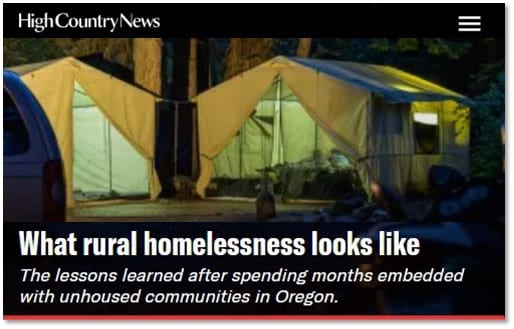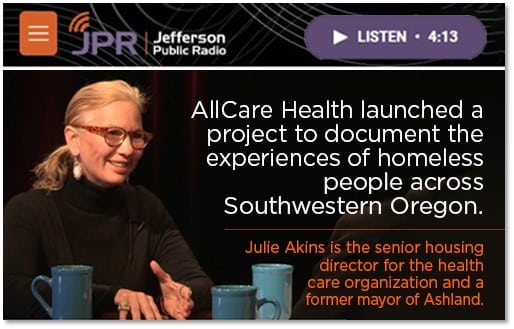Report Shines Light on Rural Homelessness
CCOs support housing development, programs for unhoused
A comprehensive report on rural homelessness published by AllCare Health in February highlights the challenges meeting short-term and long-term needs of the unhoused population.
“Finding Home: A True Story of Life Outside” was developed by Julie Akins, Senior Housing Director at AllCare Health, through hundreds of interviews with unhoused people in Josephine, Curry and Jackson counties and research on the root causes exacerbating the crisis.

The report shows some startlingly statistics about homelessness:
- Between 2020 and 2022 the number of people experiencing homelessness in Oregon rose by 23% or 3,304 people, to more than 18,000, according to the federally mandated point-in-time count.
- 46% of unhoused persons cited unemployment, low income, and economic reasons such as high rents for their condition of being unhoused. The National Coalition for the Homeless cites: “46 to 60% of unhoused people float in and out of full or part-time work.”
- Key factors in homelessness remain a reduced housing stock, notably in households earning at or below the average median income, according to EcoNorthwest.
- The Oregon Department of Education (ODE) reports almost 22,000 children in the 2017-18 school year qualified as homeless students under the ODE definition as they lack a “fixed, regular, or adequate nighttime residence.”
The report has been covered extensively in the media, including the Oregon Capital Chronicle, High Country News, KOBI-TV, and Jefferson Public Radio.

A lack of available and affordable housing is a major factor, especially in rural counties, and AllCare Health is advocating for relaxed zoning restrictions in small communities to allow new housing development.
The Oregon Legislature has approved $576 million the past two sessions to address the housing crisis, but while houses are being built there is a continued need for resources like drop-in services and short-term shelters.
Coordinated Care Organizations are committed to supporting these local services as they advocate for long-term housing solutions.


